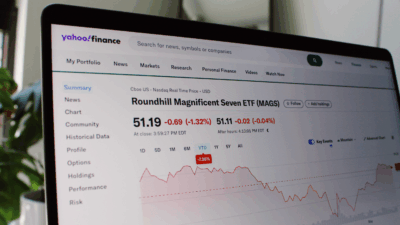‘Thinly Capitalized’ Peloton Looks to JPMorgan, Goldman for $750 Million Injection

Sign up for smart news, insights, and analysis on the biggest financial stories of the day.
Peloton sure knows how to spin its wheels these days. Unfortunately for the former pandemic darling, that’s not a good thing.
On Tuesday, Peloton announced it was $757 million in the red for its latest quarter, a huge loss that surprised Wall Street. The company also said it will take on $750 million in five-year debt from JPMorgan and Goldman Sachs to try and anchor a cash-flow turnaround.
Looking for the Right Fit
In the time of lockdowns, everyone rushed to buy a Peloton bike, or so it seemed. With lockdowns lifted, no one is rushing to buy a Peloton, or so it seems. That has led to an extended rough patch of road for the company. Activist investors asked for leadership changes and even demanded the company sell itself. Peloton’s co-founders stepped down. Then, two months after he started his new job in February, new CEO Barry McCarthy was slammed by one of those activist investors for making the company “worse off now than before.”
Peloton blamed its latest loss — which came on a 24% revenue decline, its first since going public in 2019 — on unexpectedly weak demand. Even more of a problem is that Peloton’s flailing performance has left it cash-poor. With just $879 million, McCarthy said the company — which canceled a planned $400 million factory and laid off thousands to try and rein in costs — is “thinly capitalized for a business of our scale.” Peloton agreed to the $750 million loan to help right its rig, but questions about turnaround plans remain:
- Management believes Peloton can transform itself from a hardware-first company into a fitness subscription-led digital firm, and, back in pandemic times, ex-CEO John Foley touted the wildly optimistic goal of eventually seeing 100 million subscribers to its fitness apps. While subscriptions have increased to 7 million from 700,000 in Q12020, the latest quarter only saw 5% growth.
- The company has dropped the price of its bikes and treadmills — again — but wants to raise the price of its connected fitness subscriptions (already there’s been an uptick in cancellations). In the meantime, the company’s expected $700 million in revenue next quarter is $120 million short of Wall Street expectations.
“Turnarounds are hard work,” McCarthy said on an investor call. “It’s intellectually challenging, emotionally draining, physically exhausting, and all-consuming.” Sounds like a proper Peloton workout — just without the post-recovery benefits.
Right Idea, Wrong Time: In theory, the pivot to digital is not a bad idea, as subscription-based businesses have a history of earning higher valuations from Wall Street than do manufacturers. Yet subscription kings Netflix and Spotify have each seen share prices drop over 70% since all-time peaks last year. Peloton’s market cap of $4.28 billion is off by more than 90% from its $50 billion high last year.











